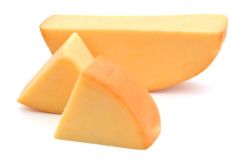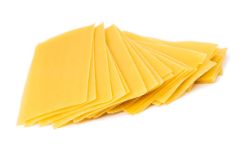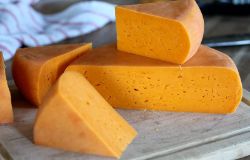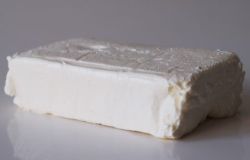Cheddar Nutrition facts
Cheddar

Pleasantly flavorful, cheddar is a firm cheese with a sharp bite and melt-in-the-mouth crumbly texture. This classic British cheese is one of the very versatile cheeses, perfect for a platter as a snacking cheese or for use in cooking.
Cheddar preparation and its use was originated in medieval times, along the southern slopes of Mendip hills, in Somerset county, in South West England.
Cow milk, raw or pasteurized, is employed to a larger extent in processing cheddar. However, a small quantity of it is also produced by using goat and sheep milk.
Similar Food
-
 American cheese 334 Cal
American cheese 334 Cal -
 Brie 334 Cal
Brie 334 Cal -
 Colby 394 Cal
Colby 394 Cal -
 Cottage 84 Cal
Cottage 84 Cal -
 Cream cheese 350 Cal
Cream cheese 350 Cal
Source of Calorie
410
Calories
-
Carbs3.37 g 3%
-
Protein22.87 g 23%
-
Fat32.50 g 74%
How long to burn off 410 Calories?
*Approximate base minutes for a 25-year-old, 65 kg adult at moderate intensity.
Swimming
64
min
Jogging
55
min
Cycling
55
min
Walking
98
min
| Nutrition Principle | Nutrition Value | Percentage of RDA |
|---|---|---|
| Principle | ||
| Energy | 410 Kcal | 20.5% |
| Carbohydrates | 3.37 g | 2.6% |
| Protein | 22.87 g | 41% |
| Total Fat | 32.5 g | 166.5% |
| Dietary Fiber | 0 g | 0% |
| Vitamins | ||
| Folates | 27 μg | 7% |
| Niacin | 0.059 mg | 4% |
| Pyridoxine | 0.066 mg | 5% |
| Riboflavin | 0.428 mg | 33% |
| Thiamin | 0.029 mg | 2.5% |
| Vitamin-A | 1242 IU | 41% |
| Vitamin-C | 0 mg | 0% |
| Vitamin-D | 24 IU | 6% |
| Vitamin-E | 0 mg | 0% |
| Vitamin K | 2.4 µg | 2% |
| Electrolytes | ||
| Sodium | 653 mg | 43.5% |
| Potassium | 74 mg | 1.5% |
| Minerals | ||
| Calcium | 710 mg | 71% |
| Copper | 0.030 mg | 3% |
| Iron | 0.14 mg | 2% |
| Magnesium | 27 mg | 7% |
| Manganese | 0.027 mg | 1% |
| Phosphorus | 455 mg | 65% |
| Zinc | 3.64 mg | 33% |